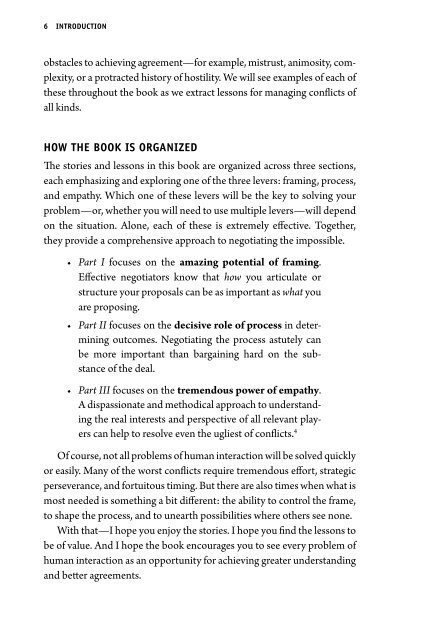NEGOTIATING IMPOSSIBLE
28SQZUn
28SQZUn
You also want an ePaper? Increase the reach of your titles
YUMPU automatically turns print PDFs into web optimized ePapers that Google loves.
6 INTRODUCTION<br />
obstacles to achieving agreement—for example, mistrust, animosity, complexity,<br />
or a protracted history of hostility. We will see examples of each of<br />
these throughout the book as we extract lessons for managing conflicts of<br />
all kinds.<br />
HOW THE BOOK IS ORGANIZED<br />
The stories and lessons in this book are organized across three sections,<br />
each emphasizing and exploring one of the three levers: framing, process,<br />
and empathy. Which one of these levers will be the key to solving your<br />
problem—or, whether you will need to use multiple levers—will depend<br />
on the situation. Alone, each of these is extremely effective. Together,<br />
they provide a comprehensive approach to negotiating the impossible.<br />
• Part I focuses on the amazing potential of framing.<br />
Effective negotiators know that how you articulate or<br />
structure your proposals can be as important as what you<br />
are proposing.<br />
• Part II focuses on the decisive role of process in determining<br />
outcomes. Negotiating the process astutely can<br />
be more important than bargaining hard on the substance<br />
of the deal.<br />
• Part III focuses on the tremendous power of empathy.<br />
A dispassionate and methodical approach to understanding<br />
the real interests and perspective of all relevant players<br />
can help to resolve even the ugliest of conflicts. 4<br />
Of course, not all problems of human interaction will be solved quickly<br />
or easily. Many of the worst conflicts require tremendous effort, strategic<br />
perseverance, and fortuitous timing. But there are also times when what is<br />
most needed is something a bit different: the ability to control the frame,<br />
to shape the process, and to unearth possibilities where others see none.<br />
With that—I hope you enjoy the stories. I hope you find the lessons to<br />
be of value. And I hope the book encourages you to see every problem of<br />
human interaction as an opportunity for achieving greater understanding<br />
and better agreements.


